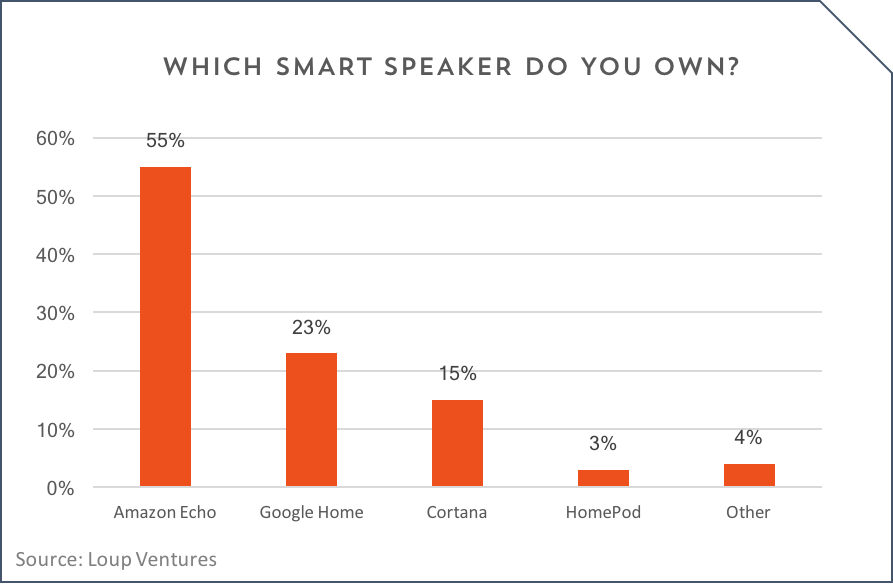We recently surveyed 520 US consumers about smart speakers and found that 89% of respondents were satisfied with them. A closer look at the results reveals the reason for this high satisfaction; early use cases are simple (Music, weather, general questions). While questions remain simple today, we expect what users demand from their smart speakers to become more complex. The survey covered smart speaker ownership, satisfaction levels, and common uses. Here are the key takeaways:
- 31% of respondents own a smart speaker.
- Amazon Echo dominates the market with 55% share, followed by Google Home at 23%. See more below.

- 89% of smart speakers owners are either satisfied (59%) or very satisfied (30%) with their device.
- Music, weather, and general knowledge questions dominate smart speaker usage. See more below.

In line with expectations. At roughly 1/3 of the U.S. population, smart speaker penetration is in line with our current estimations. Other than Cortana being slightly over-represented and Echo being slightly underrepresented, we believe the market share in the survey data also resembles the current landscape. In terms of smart speaker use cases, our survey finds the most common activities to be listening to music, getting the weather, and asking general questions. This is consistent with studies like the one from Quartz here.
It comes as no surprise, consequently, that 89% of respondents were satisfied or very satisfied with their smart speakers. This is due in large part to the relatively simple tasks that the majority of users demand of their devices. For example, Cortana scores a 57% on our comprehensive smart speaker test. On a standard report card, this is a failing grade, but Cortana is well suited to play your music from Spotify, tell you the weather, and answer any simple question you have, so it’s easy to see why the typical user would be plenty satisfied. Put simply, people aren’t using their smart speakers for anything all that smart. But we expect that to change.
Changing use over time. The top use cases for smart speakers today make sense because they are well defined and they work consistently. Benedict Evans put it well in a blog post early last year: “You can now use an audio wave-form to fill in a dialogue box – you can turn sound into text and text into a structured query, and you can work out where to send that query.” This works really well for simple ‘google-able’ questions or fetching info from a weather app, but as the use cases broaden, it is not always clear where to send a query. Just because calling up a Spotify playlist is a well built-out process doesn’t mean the same is true for a YouTube video or Podcast. It takes a huge amount of human time and energy to make these processes run smoothly. AI assistants are a new technology, so this is not a long-term concern, but until the voice ecosystem is more robust, users will have to settle for somewhat simple use cases.
The reason we are excited about smart speakers, however, involves the much wider use of voice as a computing input to remove friction. We believe the preferred interface for countless smart home devices and software services is not countless apps or small touchscreens, but your voice. This will involve drastically increasing the number of defined places you can send those queries and the number of connected devices in your life. Music, weather, and general questions won’t go away, but other activities will increasingly take place via voice. The desire for the voice interface is there. Smart speaker adoption is outpacing that of the smartphone, and the majority of users say they wouldn’t want to go back to their life without their smart speaker. We think it’s only a matter of time until voice cements itself into our everyday lives.
Disclaimer: We actively write about the themes in which we invest: virtual reality, augmented reality, artificial intelligence, and robotics. From time to time, we will write about companies that are in our portfolio. Content on this site including opinions on specific themes in technology, market estimates, and estimates and commentary regarding publicly traded or private companies is not intended for use in making investment decisions. We hold no obligation to update any of our projections. We express no warranties about any estimates or opinions we make.